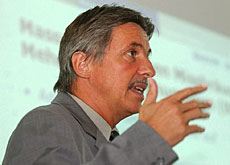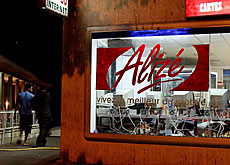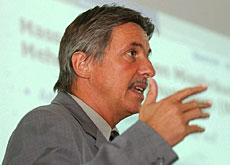Swiss want WSIS success pushed in Tunis

One of Switzerland's leading figures at the World Summit on the Information Society, Marc Furrer, tells swissinfo about his expectations for the next meeting.
Furrer, who is operational head of the Swiss delegation, hopes that the successes of the first phase of the WSIS summit in Geneva will be cemented at the second phase in Tunis from November 16-18.
But he warns that there are several controversial topics that will come up during the meeting in the Tunisian capital, including respect for civil liberties and the global management of the internet.
Furrer, who is now president of the Federal Communications Commission, has followed the work of the WSIS closely because he prepared the first phase of the summit in 2003.
Acting on behalf of Switzerland, which hosted the United Nations conference, he also led the negotiations that culminated in the adoption of a political declaration at the meeting.
Swiss President Samuel Schmid and the communications minister, Moritz Leuenberger, are to lead the delegation to Tunis.
swissinfo: What does the summit in Tunis mean for Switzerland, the host of the first phase?
Marc Furrer: The United Nations and the International Telecommunication Union (ITU) decided to organise the conference and not Switzerland. Normally, these world conferences have a first phase and then follow-up meetings.
To take full stock of the WSIS, you have to therefore take into account both its phases. And since the results of the first phase, in particular the adoption of a political declaration, are positive, it’s all the more important to finish the Tunis summit on a successful note.
What already seems to have been achieved is the adoption of a new political declaration and an action plan. But it’s equally important to agree on putting the different resolutions into practice.
swissinfo: What is Switzerland’s contribution to the second phase?
M.F.: Switzerland is participating like other states. But as the host country of the first phase of the WSIS, Switzerland is entitled to a pavilion of honour.
But, as we feel responsible for the process that was begun in Geneva and its success, we have delegated three or four people to work for the executive secretariat of the Tunis summit. They helped organise the Geneva summit.
We did this because we hope that the Tunis summit will be a success on the operational level too and that the experience gained by Switzerland in Geneva may be useful to Tunisia.
swissinfo: What will be the hottest topics of discussion in Tunis?
M.F.: Internet governance will no doubt be the most difficult issue to solve. The other sensitive area concerns the respect of human rights and civil liberties. There are many organisations that accuse the summit’s host country, Tunis, of not respecting these.
swissinfo: Can the Tunis summit fail?
M.F.: Success of this second phase is no certainty. It is likely that a solution will not be found in Tunis on internet governance, considering the firmness of the United States on this issue.
The subject of human rights is also weighing on the summit’s success. But I hope that the discussions on that will be held without too much provocation. I would like to think that the Tunisian authorities have the necessary tact to play by the rules desired by the UN. These guarantee freedom of expression for all summit participants.
I also hope that people will promote dialogue rather than go into polemics. In other words, I hope that this Tunis summit will not focus on the human rights situation in Tunisia.
swissinfo: What about the participation of the industrialised world?
M.F.: The interest was never that great. But it is bigger in Tunis than it was in Geneva, in particular due to the industrialised countries in Africa and Asia.
Having said that, the participation of the industrialised world should be greater. I also note that the media has shown more interest in political issues than in the companies active in information and communication technologies.
Be that as it may, companies that take part in the summit can seize all kinds of opportunities. If you want to do business with China, India or Brazil, you have to have government contacts. The WSIS is where this kind of meeting can take place.
swissinfo: What will happen after Tunis?
M.F.: The decisions taken in Geneva and Tunis will have to be put into practice. That can be done sector by sector, with for example an ITU-organised conference on internet governance, a UN Development Programme conference on the financial aspects of the action plan or a meeting on the freedom of expression and cultural diversity arranged by the UN Educational, Scientific and Cultural Organization (Unesco).
swissinfo-interview: Frédéric Burnand
The Swiss president, Samuel Schmid, is leading Switzerland’s delegation to the WSIS in Tunis. He will attend the opening ceremony.
Communications Minister Moritz Leuenberger will take over afterwards and will participate in a high-level round table session and represent Switzerland in the general debate and at the closing ceremony.
The Swiss delegation is pursuing the same goal as during the first phase of the WSIS – the creation of an information society for everyone.
The second phase of the WSIS summit takes place in Tunis from November 16-18.
It aims to put the results from the first phase in Geneva in December 2003 into practice, as well as discuss themes that have not been dealt with yet or need more action.
Debates will be held on internet governance, financing and the respect of civil liberties.

In compliance with the JTI standards
More: SWI swissinfo.ch certified by the Journalism Trust Initiative




You can find an overview of ongoing debates with our journalists here . Please join us!
If you want to start a conversation about a topic raised in this article or want to report factual errors, email us at english@swissinfo.ch.